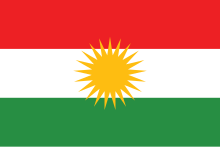Our website is made possible by displaying online advertisements to our visitors.
Please consider supporting us by disabling your ad blocker.
Kurds in Iraq
کوردانی عێراق Kurdanî Êraq العراقيين الكرد | |
|---|---|
 Flag of Kurdistan Region | |
| Total population | |
| Estimated[a] 13.8% - 16%[1] or 15% - 20% of the total population of Iraq[2] | |
| Regions with significant populations | |
| Kurdistan Region, Disputed territories of Northern Iraq, Governorates of: Erbil, Sulaymaniyah, Duhok, Halabja, Kirkuk, Nineveh, Diyala, Saladin, Wasit[citation needed], Maysan[citation needed], Baghdad[citation needed] | |
| Languages | |
| Religion | |
| Predominantly Sunni Islam Minority Shia Islam, Yazidism |
 |
The Iraqi Kurds (Kurdish: Kurdanî Êraq \ کوردانی عێراق, Arabic: أكراد العراق) are the second largest ethnic group of Iraq. They traditionally speak the Kurdish languages of Sorani, Kurmanji, Feyli and also Gorani.
Historically, Kurds in Iraq have experienced varying degrees of autonomy and marginalization. While the Treaty of Sèvres (1920) proposed Kurdish independence, this was never implemented, and Iraqi Kurds were incorporated into the modern state of Iraq. Following the overthrow of Saddam Hussein in 2003, the Kurdistan Regional Government (KRG) was established, granting the region a degree of self-governance. Iraqi Kurdistan remains a significant political and cultural entity within Iraq.[3]
Cite error: There are <ref group=lower-alpha> tags or {{efn}} templates on this page, but the references will not show without a {{reflist|group=lower-alpha}} template or {{notelist}} template (see the help page).
- ^ "Minorities in Iraq Pushed To The Brink of Existence" (PDF). European Parliament. Figure depends on whether Yazidis and Shabaks are considered Kurds: an estimated 4 million Sunni Kurds, 500 000 Feyli Shia Kurds, 500 000 Yazidis, 200 000 Kaka’i Kurds, and 250 000 Shabaks (4.7-5.45 million or 13.8-16%) in 2015
- ^ The World Factbook (Online ed.). Langley, Virginia: US Central Intelligence Agency. 2015. ISSN 1553-8133. Archived from the original on 22 December 2015. Retrieved 2 August 2015. CIA World Factbook uses a 1987 Iraqi government estimate to deduce that the Kurdish population of Iraq is 15-20% of the total population
- ^ Gunter, Michael (2008). The Kurds Ascending. New York: Palgrave MacMillan. ISBN 978-0-230-60370-7.
Previous Page Next Page


